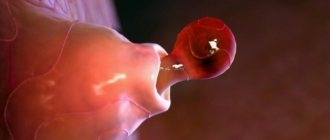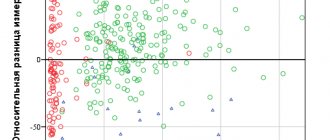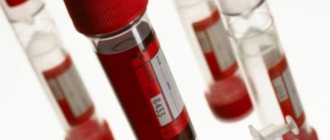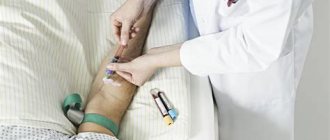What is the T3 hormone responsible for?
T3 is a thyroid hormone, one of its two main hormones and its most active hormone.
Synonym: triiodothyronine. The T3 hormone molecule contains 3 iodine atoms, which is why the number “three” appears in the name and abbreviation of the hormone. T3 hormone is the final, most active hormone of the thyroid gland, formed mainly during the breakdown of the T4 hormone with the cleavage of one iodine atom from it. After a similar separation of an atom, as after tearing off the pin from a grenade, the hormone molecule is activated - the not very strong T4 is converted into the powerful, 10 times more active, hormone T3. The T3 hormone is responsible for controlling the energy metabolism of the human body. It stimulates the processes of energy breakdown and delivery to places where it is needed. Penetrating into brain cells, the T3 hormone activates metabolic processes in them, accelerating brain development in a child and enhancing nervous activity in an adult.
The T3 hormone also activates metabolic processes in the heart and increases heart rate. In bone tissue, T3 is also able to enhance metabolism. The hormone also affects general nervous excitability, increasing it.
Free and total T3 hormone – what is it?
The T3 hormone is partially secreted by thyroid cells immediately in a “ready” form, with three iodine atoms. After triiodothyronine enters the blood, it immediately binds to carrier protein molecules that transport the hormone through the vessels to the places of its direct consumption by tissues. In a small concentration, the T3 hormone remains in the blood in a form not bound to proteins - it is called “free T3 hormone”. It is the free hormone that provides the main biological effects of T3.
General T3 hormone is protein-bound T3 + free T3 hormone. Total hormone T3 is often determined in case of questionable results of a test for free hormone - due to laboratory characteristics of the analysis, total hormone can in some cases more accurately indicate the state of thyroid hormones in a patient.
Free and general T3
T3 is found in the human body in several forms, often in the direction of analysis you can see total and free T3.
Total T3 is a hormone that contains bound and free shares of the hormone in the blood. But some react with protein molecules, and also interact with the tissues and cells of the body in various ways. Such a hormone is called bound, and its remaining molecules form free triiodothyronine. It does not react with any other substances, but simply “travels” throughout the body as part of the blood.
A general blood test for T3 shows the total concentration of bound and free hormone. It must be said that it is not carried out as often as a free analysis, since the results are influenced by many external factors.
However, in some cases such analysis is necessary, for example, when:
- disruption of the pituitary gland and thyroid gland;
- sudden weight gain;
- presence of edema;
- disruption of the menstrual cycle;
- severe PMS;
- painful menstruation.
Reference! The main difference between total and free T3 hormone analyzes is accuracy and information content. Therefore, a free T3 test is most often prescribed.
T3 hormone test
Analysis of hormones T3, T4, TSH is the main analysis in the work of an endocrinologist who treats thyroid diseases. For economic reasons, the T3 hormone is often not tested at all - this reduces the overall cost of blood testing for hormones, but in some cases it can lead to diagnostic errors.
It should be borne in mind that with nodular toxic goiter (Plummer's disease = toxic adenoma of the thyroid gland, also with multinodular toxic goiter), often autonomously functioning nodes produce the T3 hormone. There are also cases of more active production of the T3 hormone in diffuse toxic goiter (Graves' disease, Graves' disease). For such situations, when the T3 hormone is predominantly elevated, a special term has even been coined - T3 toxicosis. It occurs with more severe symptoms than with an increase primarily in the T4 hormone, and is more slowly eliminated with drug therapy.
How to prepare for the analysis?
Some experts recommend taking a thyroid hormone test on an empty stomach, but there is another opinion - this is not required, as it does not change the level of hormones. However, it is not recommended to consume meat and other fatty foods before the study, as this affects the state of the blood serum, and it will be quite difficult for a specialist to isolate the formed elements in it.
In order for the T3 analysis result to be as reliable as possible, you need to:
- Do not eat fatty or meaty foods 24 hours before the test.
- Avoid stress, drinking alcohol and smoking.
- Tell your doctor about the medications you are taking. Some may have to be canceled for a while.
- Tell the doctor about your history of serious illnesses; some pathologies affect the results.
Important! It has been proven that a woman's use of contraceptive drugs affects the concentration of free T3, and according to the test results, the woman could be misdiagnosed with hyperthyroidism.
Norm of T3 hormone in women, men, children
The normal level of T3 hormone in women and men over 18 years of age is:
- general - 1.2–3.1 nmol/l,
- free - 3.1–6.8 pmol/l.
Normal levels of triiodothyronine in children are the same as in adults; they should be in the range of 3.1–6.8 pmol/l. But the level of other thyroid hormones depends on the age of the child.
Increased T3 hormone
If T3 is elevated, this means that the thyroid gland has malfunctioned. This may be iodine deficiency, thyroiditis, endemic goiter. Increased concentrations are dangerous due to catabolic disorders, loss of body weight, and deterioration in physical development.
Hormonal imbalance can lead to disruption of many systems at once:
- nervous;
- cardiovascular;
- urinary;
- reproductive;
- digestive;
- hepatobiliary;
- immune.
Elevated T3 is the basis for prescribing hormonal therapy, but only an endocrinologist can prescribe drugs.
Norm of T3 hormone
The norm of the hormones T3, T4, TSH is usually indicated on the form with the analysis results. All modern laboratories use a wide variety of laboratory equipment of different classes, which can consume different sets of reagents. That is why the very concept of “normal T3 hormone” now practically does not exist - the norm is the value that falls within the reference limits (standards) indicated on the laboratory form. There is no longer any need to memorize different versions of standards. If suddenly you receive the result of a blood test in handwritten form on a form without indicating the norm of the T3 hormone and other hormones, it is unlikely that such a laboratory conclusion should be completely trusted. Modern high-quality laboratory services always generate a form using a computer, indicating both the exact value of the hormone and the exact normal limits.
At the Northwestern Center for Endocrinology, blood tests for the T3 hormone are performed using high-precision immunochemiluminescent analyzers of the 3rd generation Abbott Architect (USA) and Advia Centaur (Germany). The T3 hormone norm for these analyzers is 2.62-5.69 pmol/l.
Increased T3 hormone
An increase in the T3 hormone occurs in various types of thyrotoxicosis (increased levels of thyroid hormones in the blood).
If the free T3 hormone is elevated, the patient is usually bothered by a number of symptoms (it should be borne in mind that the T3 hormone is a very active hormone, so the symptoms will be very pronounced):
- patients are concerned about irritability, nervousness, rapid excitability and rapid fatigue (sometimes this symptom complex is called “irritable weakness”);
- very often there is tremor (shaking) of the fingers;
- heart rhythm disturbances such as tachyarrhythmia (increased heart rate), as well as the appearance of extrasystole (additional contractions of the heart followed by a long period of “rest”, subjectively perceived by patients as “interruptions” in the work of the heart) are very characteristic;
- weight loss.
It is important to note that the blood test for free T3 hormone is one of the most complex tests in the laboratory. It is associated with a significant number of potential laboratory errors. The most common is a false increase in the T3 hormone in the blood - this research result reaches the endocrinologists of the North-Western Endocrinology Center almost every day. An analysis of other thyroid hormones helps to suspect a laboratory error - if the TSH hormone is normal and the T3 hormone is elevated, there is every reason to suspect the laboratory of a poor-quality analysis. The same suspicion arises if TSH is normal or elevated, T3 hormone is elevated, and T4 hormone is normal. In all cases of questionable laboratory conclusions, a repeat analysis should be carried out in a high-precision immunochemiluminescent laboratory of the 3rd generation of a specialized endocrinology center, the quality of which will not be in any doubt. The Northwestern Endocrinology Center conducts similar screening tests for its patients almost every day, and very often the “strange changes” identified during the initial analysis turn out to be untrue.
What to do if the T3 hormone is elevated, and there is no doubt about the quality of the test (TSH hormone is almost always reduced, and T4 is usually elevated, although not always)? There can be only one piece of advice - you need to consult an endocrinologist with significant experience in the treatment of thyroid diseases.
If T3 hormone is low
Free T3 hormone is reduced due to a general disturbance in the production of thyroid hormones. A similar violation occurs:
- with autoimmune thyroiditis (Hashimoto's thyroiditis), when the immune process destroys some of the thyroid cells and they stop producing hormones - most often forever;
- in the treatment of diffuse toxic goiter (or nodular toxic goiter) with thyreostatics (mercazolyl, tyrosol, propicil) with the development of hypothyroidism due to an excessive dose of the drug;
- after surgery to remove all or part of the thyroid gland;
- after radioactive iodine therapy for diffuse toxic goiter;
- after using cordarone, amiodarone or other drugs containing significant amounts of iodine.
When developing a deficiency of thyroid hormones, there is an important rule - first the T4 hormone decreases below normal, and only after that you see that the T3 hormone is low in the blood. Considering that the activity of the T3 hormone exceeds the activity of T4 by almost 10 times, the body, as it were, “transfers money into freely convertible currency” if it feels that a real shortage of hormones is developing. This effect is called “increased peripheral conversion of T4 to T3” and is intended to smooth out the effects of hypothyroidism - a deficiency of thyroid hormones.
If in your blood test the T3 hormone is low (total or free), and the TSH and T4 hormones are within normal limits, you are most likely dealing with a laboratory error. Underestimation of the level of the T3 hormone is a typical mistake of many laboratory services in St. Petersburg and the Leningrad region, which occurs very often. In such cases, it is necessary to contact a specialized 3rd generation laboratory to double-check the analysis - for example, the laboratory of the North-Western Endocrinology Center.
Triiodothyronine (free T3)
Preparation for the study: on the eve of the study, it is necessary to exclude sports training and stress. Blood is taken on an empty stomach. Immediately before drawing blood, the patient should be at rest for about 30 minutes. 1 month before the study, it is necessary to avoid taking thyroid hormones, unless there are special instructions from an endocrinologist. 2-3 days before the study, avoid taking 131I and 99mTc and drugs containing iodine. Material for research: serum. Determination method: enzyme-linked immunosorbent assay. T3 is produced by the follicular cells of the thyroid gland under the control of TSH (thyroid-stimulating hormone). In peripheral tissues it is formed during deiodination of T4. Free T3 is the active part of total T3, accounting for 0.2 - 0.5%. Increases heat production and oxygen consumption by all body tissues, with the exception of brain tissue, spleen and testicles. Stimulates the synthesis of vitamin A in the liver. Reduces the concentration of cholesterol and triglycerides in the blood, accelerates protein metabolism. Increases calcium excretion in urine, activates bone turnover, but to a greater extent, bone resorption. It has a positive chrono- and inotropic effect on the heart. Stimulates reticular formation and cortical processes in the central nervous system. By the age of 11-15 years, the concentration of free T3 reaches adult levels. In men and women over 65 years of age, there is a decrease in free T3 in serum and plasma. During pregnancy, T3 decreases from the first to the third trimester. One week after delivery, serum free T3 levels return to normal. Women have lower concentrations of free T3 than men by an average of 5 - 10%. Free T3 is characterized by seasonal fluctuations: the maximum level of free T3 occurs from September to February, the minimum in the summer. Standard for enzyme immunoassay: 1.4 - 4.2 pg/ml pregnant women: 1.8 - 4.2 pg/ml Standard for chemiluminescence immunoassay: healthy adult men and women - 1.8 - 4.2 pg/ml children 1-3 years - m: 1.9 - 4.9 pg/ml; w: 2.3 - 5.4 pg/ml 4-6 years - m: 1.6 - 6.0 pg/ml; f: 3.0 - 6.4 pg/ml 7-8 years - m: 2.6 - 6.8 pg/ml; w: 2.6 - 7.5 pg/ml 9-10 years - m: 2.1 - 14.9 pg/ml; f: 1.3 - 11.2 pg/ml 11 years - m: 2.3 - 5.2 pg/ml; f: 2.2 - 4.7 pg/ml 12 years - m: 2.5 - 4.6 pg/ml; f: 2.6 - 4.1 pg/ml 13 years - m: 2.6 - 4.7 pg/ml; f: 2.5 - 5.2 pg/ml 14 years - m: 2.8 - 5.0 pg/ml; f: 2.8 - 5.2 pg/ml 15 years - m: 2.3 - 4.6 pg/ml; f: 2.4 - 4.2 pg/ml 16 years - m: 2.4 - 5.0 pg/ml; f: 2.5 - 3.9 pg/ml 17 years - m: 2.1 - 4.2 pg/ml; w: 2.0 - 4.4 pg/ml 18-19 years old - m: 2.0 - 4.1 pg/ml; g: 2.5 - 6.2 pg/ml Increased free T3 level: thyrotropinoma; toxic goiter; isolated T3 toxicosis; thyroiditis; thyrotoxic adenoma; T4-resistant hypothyroidism; thyroid hormone resistance syndrome; TSH-independent thyrotoxicosis; postpartum thyroid dysfunction; choriocarcinoma; decreased levels of thyroxine-binding globulin; myelomas with high levels of IgG; nephrotic syndrome; hemodialysis; chronic liver diseases. An increase in the concentration of free T3 with normal levels of total T4 and TSH can occur with iodine deficiency, isolated T3 thyrotoxicosis, autoimmune thyroiditis, a decrease in the level of thyroxine-binding globulin, and taking certain oral contraceptives. To clarify the diagnosis, it is recommended to donate blood to determine AT-TG and AT-TPO and perform an ultrasound of the thyroid gland. Decrease in free T3 level: uncompensated primary adrenal insufficiency; severe nonthyroidal pathology, including somatic and mental illnesses; recovery period after serious illness; primary, secondary, tertiary hypothyroidism; artificial thyrotoxicosis due to self-prescription of T4; low protein and low calorie diet; heavy physical activity in women; weight loss; taking amiodarone, large doses of propranolol, x-ray iodine contrast agents.






